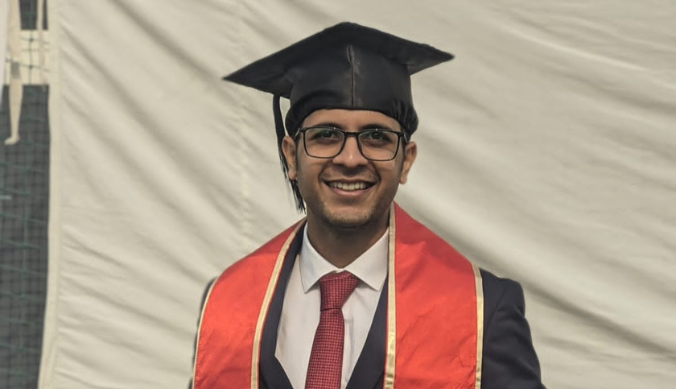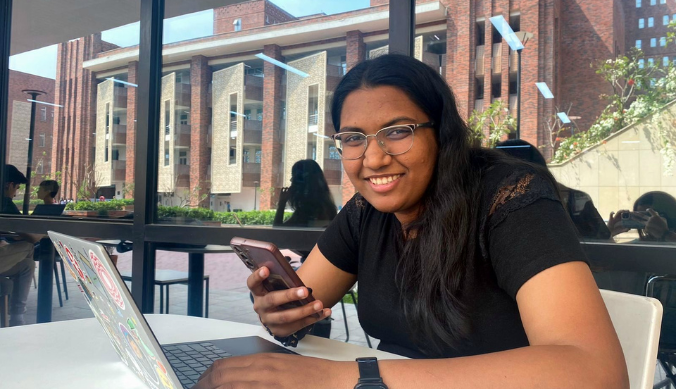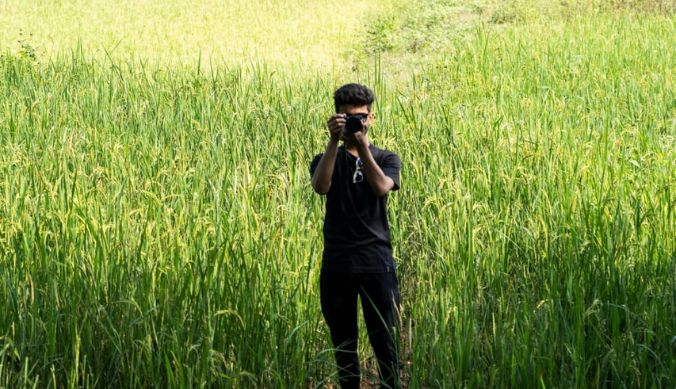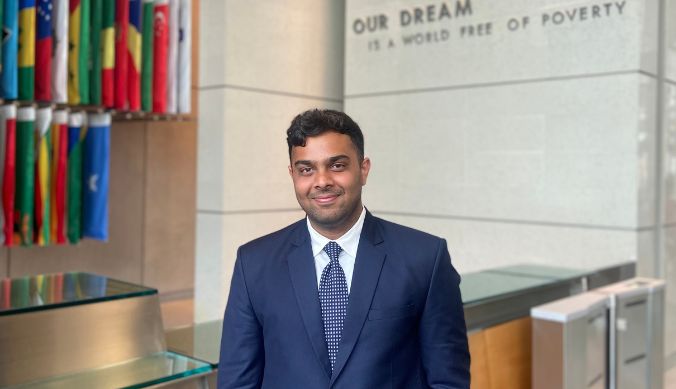The Road to Rhodes: Ashoka University student bags prestigious scholarship
Daksh Walia, an M.A. Economics student at Ashoka University and a 2022 Rhodes scholar shares his story of receiving this prestigious scholarship

Office of PR & Communications
5 December, 2022 | 4m readDaksh Walia is a final year student of M.A. Economics at Ashoka University. In Economics, he is particularly interested in studying labour economics, welfare economics, and the economics of climate change impacts. Outside of that, Daksh’s curiosity extends to theories of justice, social epistemology, and socio-political philosophy. He is currently working on a Master’s thesis studying the impact of labour law changes on the demand and supply of the female labour force in India.
He has recently been awarded the Rhodes scholarship for 2022. Established in 1902, The Rhodes Scholarship by the Rhodes Trust is the oldest international scholarship programme, enabling outstanding young people from around the world to study at the University of Oxford.
We recently caught up with Daksh to congratulate him and get a first-person perspective on what the application process is like, why he applied for Rhodes and how did Ashoka figure in his journey.
Here is what he had to say:
How did you feel when you first heard the news and how are you feeling now, when you have gotten some time to process the news?
The final interview was held physically in Delhi after a two-year break, so the announcement was a bit dramatic: all of us standing in one room waiting for the results. Very honestly, it came as a massive shock to me, I did not really think I would get it. I felt that there were moments in the final interview where I did not do as well as I could have. I had prepared myself for disappointment, so when they took my name, I was absolutely overwhelmed and started weeping, which continued for about an hour.
While I am not as overwhelmed by it now, I think that it has not fully sunk in yet. It is hard to even imagine myself in Oxford; it just does not seem to make sense. Nonetheless, I am really happy about it—to have this opportunity to learn and grow as an individual in ways I had never thought possible.
There is certainly an element of luck, which was in my favour that day. I think there were many others among the finalists who were equally or even more deserving and could have been selected. I am looking forward to this new step in life, which I am sure will require a lot of adaptation, but would also be a great learning opportunity.
What was the process of application like and how did you deal with the continuous rigor that it requires?
The application process is certainly rigorous in that it demands a lot of information, introspection, and expression. I think the application process itself was helpful for me because in trying to articulate my goals and plans for the various statements and interviews, I developed my own understanding of what I want to do. This helped me identify the various paths I could take towards my goals, and that clarity also helped me establish alternative paths to pursue in case I did not get the scholarship.
Apart from that, I never really tried to do something with the idea that it would help me with the scholarship application. The decision to apply was finalized only a month before the deadline. In a way, there is nothing special one can do about the application or the interviews either. They are designed to be technical only to the extent that one needs some knowledge about the field of study one is interested in. Beyond that, there is not much one can do to prepare for them.
I did realize that maybe I should be practising for the interviews, but I just could not understand what to prepare for, apart from sitting and thinking about my interests, plans, and the things that drive me. So, in a sense, I did not really find the application process too gruelling and just tackled each round as it arrived.
When did you consider that you wanted to apply for Rhodes and that it was the right fit for you?
I first came across the scholarship, when someone mentioned that Prof. Anisha Sharma from the Department of Economics was a Rhodes scholar. My curiosity led me to Google what it was all about. Later, when Vighnesh Hampapura was selected for the scholarship in 2020, it was the first time that I thought of the possibility of applying for it, but I never thought I would get it.
The idea of a global community of brilliant minds at Rhodes excited me, and the prospect of Oxford was both daunting and amazing at the same time. However, back then, I did not think I had what it took to even consider applying. It was only after a couple of years of my friends nagging me continuously to apply that I finally decided to do so this year in June.
While I was very pessimistic about my chances, I knew that getting the scholarship would expose me to a group of brilliant minds who would help me grow intellectually and personally. I also knew that Rhodes and Oxford would be the perfect place for me to pursue my passion for both Economics and Political Philosophy. So, the decision to apply was a combination of knowing that the scholarship would immensely help me, constant motivation from my friends, and just my desire to see if all that I have done amounted to anything substantial when it came to something like the Rhodes scholarship.
How has your time at Ashoka shaped you as an individual? Have there been some key learnings that you think aided your application?
While I ended up knowing about Ashoka and then studying for my undergraduate studies through a series of rather comical, unfortunate events, it was a decision that has been pivotal in my journey. I think that the faculty at Ashoka helped me prosper intellectually, while the variety of passions I could simultaneously pursue was perfect for a curious person like me. There are so many subjects I am interested in. While I chose to pursue Economics, Ashoka allowed me to stay in touch with areas I was interested in like political philosophy, ethics, and epistemology. In addition, the research focus of all courses at Ashoka University, especially in the third year, was ideal for me to understand research methodologies and later pursue it at more advanced levels.
At the same time, I would be amiss without mentioning that it was the generosity of the financial aid program at Ashoka that allowed me to study here, both for my undergraduate and postgraduate degrees. I was lost and unsure of my future in 2018 when I got my acceptance letter and financial aid offer from Ashoka. Now, I cannot fathom how life would have panned out without that. I was offered the chance to study with some of the top researchers in India, which helped me develop intellectually, pursue research of my own, and eventually paved the path for the Rhodes scholarship.
Do you have any mentors at or outside of Ashoka University who have played an important role in your success?
There are many people who have helped me, not just through the application, but through generally navigating life. While they are not exactly mentors, my closest friends have provided immense support to me, and that has allowed me to become the person that I am. They have been a constant source of encouragement for everything I have done, including the scholarship application, and their presence has also ensured I’m never too anxious about an application or challenge because I know they’ll be there for me irrespective of the outcome.
At Ashoka, Professor Ashwini Deshpande was one of the first people that I worked with and had the chance to interact deeply with. She has been a constant support, from helping me write an essay for a competition organized by the International Economic Association in 2019, to working with her on a research project over the past year. My interactions with Professor Hemanshu Kumar during my undergraduate studies helped me understand the contours of academic research better and also exposed me to a vast area of studies about social policies in India. More recently, my work with Professor Kanika Mahajan has helped me expand my research skills quite significantly. Over the last few months, she has also been instrumental in helping me plan for the future and understand the challenges and opportunities of economic research. With respect to the Rhodes application itself, Professor Anisha Sharma’s experience with the processes was invaluable in helping me soothe my anxieties before the interviews by giving me an idea of what to expect from them.
Outside of Ashoka, I have worked with many brilliant people who have taught me a lot. Sharang Shah is one such person whom I met during a policy internship at Chase India. He was kind enough to take me under his wing and continue interacting with me even after the internship was over. Conversations with him over the last four years have been invaluable in helping me plan and apply for opportunities, while also thinking about the path I want to pursue in life.
What do you want to pursue at Oxford and how has the experience at Ashoka prepared you for the same?
I am applying for the M.Phil + D.Phil integrated program in Economics at Oxford (hopefully I will get it), to pursue research in various fields that I am interested in including labour economics, political economy, development economics, and climate change.
My experience at Ashoka has prepared me well for this course and for Oxford in general, in two very different ways. While my undergraduate studies exposed me to a variety of subjects and fields which would go a long way in helping me engage meaningfully with the academic community at Oxford, my Masters here has prepared me specifically for the M.Phil+D.Phil. The rigour with which economics is taught at Ashoka will help me adapt to the program well, and hopefully, I will not have to struggle too much in the early months.
Apart from that, the main focus of my studies at Oxford will be research. Pursuing class research projects throughout my studies, and now attempting to write a postgraduate thesis, have helped me understand the obstacles one encounters while pursuing research and how to overcome them. This will enable me to be better prepared when I will inevitably face these problems during my future studies.
What is the one piece of advice that you would like to give prospective applicants?
One piece of advice I would definitely give people is, to do what works for them. It sounds cliché, but I think it is fairly important. At the interviews, there were some people who had prepared a lot and some who had not done much, like me. I know that not preparing too intensively works better for me because it minimizes the stress I feel during the actual interview. I can back myself in such a setting as long as I am not feeling stressed. For many others, the opposite is true—preparing a lot helps them in performing well during the interview.
The most crucial thing about the interviews is that they force one to introspect. If you have not thought deeply about your passions, motivations, and future plans, it will be hard to clearly articulate yourself during the interview. So, the application process is certainly one that requires a lot of introspection and clarity.
As for the application itself, I would just say do what you are passionate about and that is what will get you through the process. Most of the people I met during the final interviews were very passionate about their fields. They had applied to Rhodes because of all the work they had done, rather than doing some work specifically with the scholarship in mind.
So, that is all I can say—pursue your passions, and hopefully, you will get recognized for it!
I think I got incredibly lucky in being selected. Even if I had not got the scholarship, I do not think my plans for the future would have changed a lot. An added benefit of this approach, however, is that even if you do not get the scholarship, you will know your passions and can continue pursuing them.










